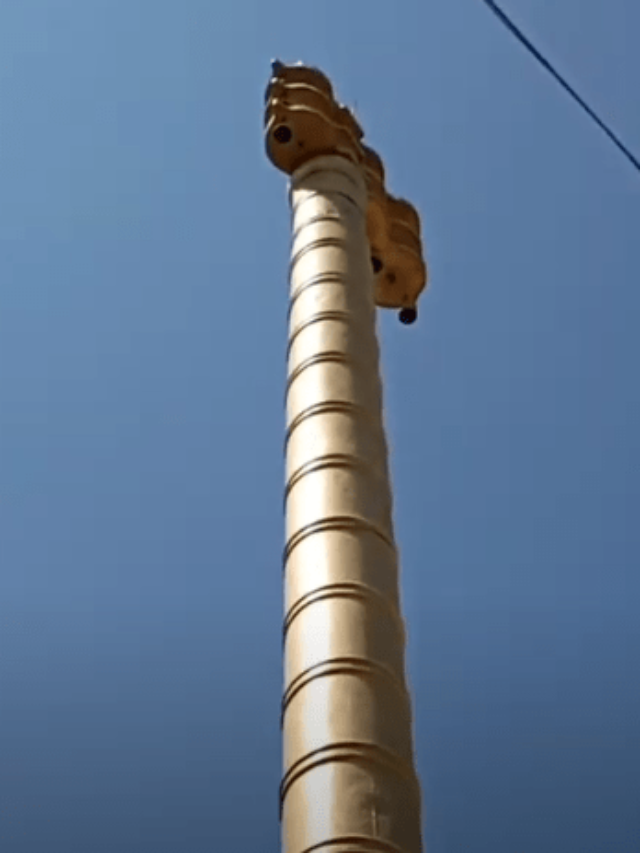The Kolanupaka Jain Temple, a brilliant gem settled in the Yadadri Bhuvanagiri locale of Telangana, India, flaunts a rich history extending back more than 2,000 years. This hallowed site, otherwise called Kulpakji, isn’t just a journey objective for Jains yet in addition an enthralling milestone that captivates history buffs, craftsmanship fans, and anybody looking for serenity.
Table of Contents
This blog entry digs into the spellbinding story of the Kolanupaka Jain Temple, investigating its verifiable importance, structural wonders, and the otherworldly emanation it radiates.

A Heritage Cut in Stone: The Historical backdrop of Kolanupaka Jain Temple
Legends weave an intriguing story around the sanctuary’s starting point. One prevalent thinking credits its development to Sovereign Bharata, the child of the amazing characters Ruler Dushyanta and Sovereign Shakuntala. Verifiable proof recommends Jainism thrived in the locale as soon as the fourth hundred years, and Kolanupaka arose as a conspicuous Jain focus.
The sanctuary’s engineering mirrors the imaginative impacts of different times. While the specific date of development stays dubious, specialists accept it very well may be anyplace between the first century BCE and the first century CE. The sanctuary complex has gone through redesigns and augmentations throughout the long term, every period transforming the design.

A Visual Ensemble: Disclosing the Compositional Magnificence
Step into the Kolanupaka Jain Temple, and get ready to be entranced by a spellbinding conversion of red sandstone and white marble. The fundamental sanctuary houses three respected gods: Ruler Rishabhanatha, the primary Tirthankara (profound head) of Jainism, Master Neminatha, the 22nd Tirthankara, and Ruler Mahavira, the 24th and last Tirthankara.
The most enthralling symbol is the one of Master Rishabhanatha, famously known as Manikyaswami and Jivantasvami. Cut from an entrancing green stone, this sculpture has drawn in enthusiasts for a long time. The transcending presence of Master Mahavira’s venerated image, etched from a solitary piece of jade, is one more incredible sight.
Decorating the walls of the sanctuary are flawless carvings portraying stories from Jain sacred texts and mind-boggling mathematical examples. Eight sculptures of other Tirthankaras beauty on the two sides of the fundamental sanctum, each transmitting an emanation of harmony and peacefulness.

Venturing outside the principal sanctum, one experiences a peaceful yard and other more modest sanctuaries committed to Jain divinities like Simandar Master and Mata Padmavati. The many-sided subtleties and the fastidious craftsmanship clear all through the sanctuary complex are a demonstration of the remarkable abilities of past craftsmen.
A Safe House for the Spirit: The Otherworldly Meaning of Kolanupaka Jain Temple
The Kolanupaka Jain Temple is a position of colossal otherworldly importance for Jains, especially those having a place with the Swetambara faction. Jainism, an old Indian religion, underlines peacefulness, ahimsa, and the freedom of the spirit from the pattern of resurrection. The quiet air of the sanctuary cultivates consideration and profound thoughtfulness, permitting aficionados to associate with their internal identities and the principles of Jainism.
Aside from Jain celebrations, the sanctuary additionally celebrates significant Hindu celebrations like Maha Shivaratri and Diwali, mirroring the soul of strict resistance and congruity that saturates the area.

An Excursion Through Time: Encountering the Kolanupaka Jain Temple
The Kolanupaka Jain Temple is an enthralling objective for anybody looking to investigate the social and otherworldly legacy of India. Found roughly 80 kilometers from Hyderabad, the sanctuary is effectively available by street.
For guests new to Jain traditions, dressing unobtrusively and keeping up with quietness inside the sanctuary complex is suggested. Photography is typically allowed, however, it’s generally affable to look for consent before taking pictures, particularly during petition services.
A visit to the Kolanupaka Jain Temple is something beyond touring; it’s an excursion through time. It’s a valuable chance to observe the compositional brightness of a former period, submerge oneself in the tranquility of an otherworldly haven, and gain a more profound comprehension of the Jain way of thinking.

Past the Sanctuary Walls: Investigating Kolanupaka
The Archeological Museum
Settled inside the sanctuary complex is the Kolanupaka Site Historical Center, a mother lode for history lovers. This historical center houses a dazzling assortment of models, engravings, and relics tracing back to the sixth to sixteenth hundred years. The displays grandstand the creative styles of the Chalukya and Kakatiya traditions that managed the locale. You’ll find enamoring figures portraying different Jain Tirthankaras, Hindu divinities like Shiva and Vishnu, and dazzling fanciful animals. These relics offer significant experiences into the strict convictions, imaginative articulations, and day-to-day existence of individuals who possessed this locale hundreds of years prior.
A Journey to Someshwara Temple
A short stroll from the Jain sanctuary lies the Someshwara Sanctuary, committed to Master Shiva. While the specific date of development stays muddled, authentic proof recommends it very well be from the eleventh or twelfth hundred years. The sanctuary’s design mirrors the Kalyana Chalukya style, known for its perplexing carvings and pillared lobbies. Strangely, ongoing redesigns at Someshwara Sanctuary uncovered two gigantic figures of Jain Tirthankara feet, alluding to the locale’s rich Jain legacy.

Investigating the Environs
Kolanupaka offers a brief look into country Telangana life. Adventure past the sanctuary complex and investigate the energetic nearby business sectors, where you can track down handwoven materials, conventional adornments, and tasty neighborhood passage. For a dash of experience, take a short climb to local hillocks for all-encompassing perspectives on the encompassing open country.
Celebrations and Celebrations
The Kolanupaka Jain Temple wakes up during Jain celebrations like Paryushan Parva and Mahavir Jayanti. These celebrations are set apart by petition services, elaborate parades, and local meetings. Seeing these festivals gives me a special chance to encounter Jain traditions and customs firsthand.
A Heritage Preserved
The Kolanupaka Jain Temple remains a demonstration of getting through the tradition of Jainism in India. The continuous reclamation endeavors by the Archeological Study of India (ASI) guarantee its protection for a long time into the future. By visiting and supporting this verifiable milestone, you have an impact in protecting this imperative string in the rich embroidery of Indian culture.
In Conclusion
The Kolanupaka Jain Temple is something beyond a position of love; it’s an enrapturing mix of history, workmanship, and otherworldliness. A visit here permits you to dig into the captivating universe of Jainism, appreciate the engineering dominance of a former time, and experience the peacefulness of a consecrated space. In this way, set out on your excursion to Kolanupaka and find the enchanted that is standing by!





